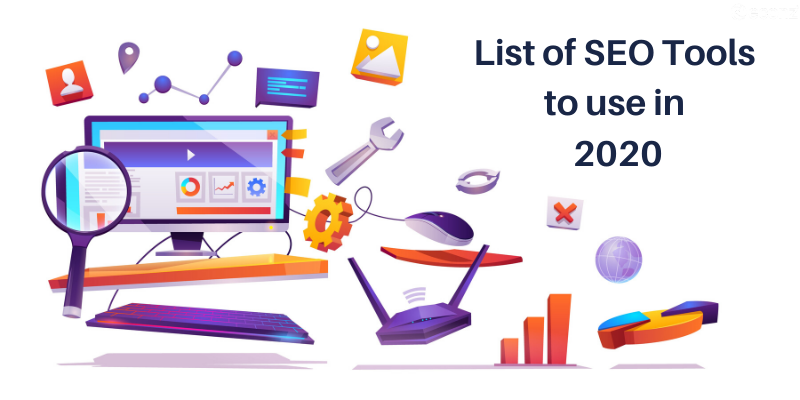List of SEO Tools to use in 2020

Top trends of Social Media in 2020
May 21, 2020
Agile HR: The Change We Need to See
August 14, 2020Introduction to SEO
Companies that sell products and services online should always focus on their search engine rankings. Monitoring the performance of keywords and analyzing research-driven reports will assist your organization to excel compared to other businesses in your space. As Google continues to expand its search technology with new algorithms and pushes further into artificial intelligence (AI), you'll want to stay current with search engine optimization (SEO) applications. You can "optimize" your website's position within rankings. Read on to find out how to pick the right tools to do this.
Importance of SEO
The emphasis on tools is essential because there's no magical way to get your website atop every individual search results page, at least not organically, even though there are enough practices to do so. If you want to get a paid search ad spot, then Google AdWords will gladly take your money. This will unquestionably put your website at the top of Google's search results but always with a pointer that yours is a paid position. To win more relevant and customer-trusted organic search spots (meaning those points that begin below all of those listed with an "Ad" icon), you must have a well-balanced and extensive SEO strategy in place.
Optimize Website With SEO Tools
Mastering SEO optimization can be difficult, especially if you're just beginning. Luckily, finding the best SEO tools is easy and we've compiled them all on this list. We've researched out to a lot of SEO blogs/articles to find out what the most suitable SEO tool is and what keyword tracking tools are influencing the SEO experts. You don't need to try all these tools, you just need to figure out which one serves best for your needs.
Best Search Engine Optimization (SEO) Tools
1. Google Search Console
Google Search Console is the best free SEO tool, simply because the data comes from Google.
It has a treasure of insights correlated to your website's search metrics including any issues relating to indexing, keyword performance, mobile usability and much more. GSC supports anyone with a website to optimize their organic performance.
2. Google Trends
Google Trends examines the popularity of a search term in Google. It's most beneficial for easing marketers to track seasonality or to understand how a topic is trending over a period.
3. Google Keyword Planner
Google Keyword Planner is Google's keyword research tool to assist you to understand the volume, value, and competition of any keyword. Keyword Planner is meant to be a pay-per-click tool that helps you understand your topic's popularity, competition, and recommended bid. However, it can also be directional in assisting you to determine your SEO strategy.
4. Google Page speed Insights
We all know page speed is more valuable than ever in the world of SEO. Fortunately, Google makes it simple for you to understand your website's page load performance and where there are spaces for improvement – if required.
5. Google Analytics
Google Analytics is the most common analytics tool on the market. Using this tool, companies can track their website performance across channels and understand which sources bring the most relevant traffic to the website.
6. Google Tag Manager
Google Tag Manager (GTM) is a free SEO tool that adds versatility to Google Analytics while enabling you to manage and implement tags (tracking code or snippets of code) on your website or mobile app.
Tag Manager works for a variety of functions, such as creating heat maps, scroll tracking, administering surveys, monitoring form submissions, remarketing or tracking how people arrive at your site. It can also track activities like downloads or shopping cart abandonment.
7. Moz Keyword Explorer
Getting outside the world of Google, Moz offers the ability to analyze keywords, links, SERP or on-site page optimization. Moz allows you to enter your page on their website for limited SEO recommendations or you can use its extension – MozBar. As far as free tools are concerned, the basic version of Keyword Explorer is plenty adequate and just gets better every year. The pro version offers a more comprehensive analysis and SEO insights that are well worth the money.
8. Answer the Public
This tool creates a list of visualized search topics based on a single query. Answer the Public is ideal for generating long-tail keywords and ranking for the advertised snippet. Not sure if you're creating the right blog content? Answer the Public can help validate or re-direct your SEO efforts.
9. Woorank
Woorank is a website review tool and SEO checker that analyses on-page and off-page SEO to rank better for search. It provides an actionable checklist that gives your team the insights it needs to fix performance issues and increase search rankings.
10. SEMrush
SEMrush is one of the best SEO tools available on the market. It helps you perform keyword research, audit backlinks and understand your site's domain authority. In addition, the site helps you find out the keywords your competitors rank for.
11. Ahrefs
Ahrefs is the top competitor to SEMrush, with an emphasis on link-building. This tool helps you perform backlink analysis to understand good and bad links coming to your site. Marketers can also use Ahrefs for competitive analysis to audit which sites should be targeted for potential guest posts.
12. Majestic
Majestic SEO provides link intelligence data to help your company improve performance. It provides some interesting features such as "The Majestic Million," which allows you to see the ranking of the top million websites by referring to subnets. Similar to Ahrefs and SEMrush, Majestic also allows you to check backlinks, benchmark keyword data and perform competitive analysis.
13. Screaming Frog
Screaming Frog is an SEO spider application that evaluates on-site SEO issues. It can find broken links, server errors, blocked URLs and duplicate pages. It also crawls your site to analyze technical and on-site SEO.
14. SEOquake
SEOquake performs a complete SEO audit of any site from within your browser. This tool allows you to examine internal and external links to your website and keyword data. It also provides a real-time diagnosis on optimization issues impacting your site's SEO.
15. GTmetrix
GTmetrix is a speed and performance audit tool that provides insights into root causes behind performance failures and generates various benchmark scores. GTmetrix then provides actionable recommendations on improving your site speed.
16. Keywords Everywhere
This is a convenient tool that can be installed on Google Chrome or Firefox to show monthly search volume and cost-per-click on a specific keyword search in Google. It also includes metrics for the "People Also Search For" and "Related" searches in Google.
17. Google Mobile-Friendly Test
Is your website mobile-friendly? There's no better way to find out than letting Google tell you itself. Simply enter your website and Google will run a free analysis for you.
18. SimilarWeb
Receive market intelligence on almost any company including overall site ranking, traffic sources, and market strategies. The free version provides a basic snapshot of any website or app, while the paid version is obviously much more powerful.
19. Bing Webmaster Tools
Similar to Google, Bing has its own spider that crawls sites and provides recommendations to get indexed on Bing. It's easy to implement and manage with a simple tracking code and a dashboard to understand site performance.
20. Wheregoes
As the site describes, Wheregoes does one thing. It takes a URL and shows the entire path of redirects and meta-refreshes leading to the final destination. This allows you to diagnose complex link problems and see who's tracking to a given URL.
21. Wayback Machine
While it may not seem like an SEO tool on the surface, Wayback Machine can be used to determine if a certain URL existed at a certain point. This can help provide context to 404 errors found after site migrations.
22. Lighthouse
Lighthouse is an open-source, automated tool for improving the performance, quality and correctness of your web apps.
Conclusion
SEO tools are an important consideration to help optimize a website for search engines. Many tools differ in the scope of their function yet also analyze different SEO factors. Some of the most important areas to be analyzed are keywords, content, backlinks, domain and social media.
The SEO tools on this list aren't just enough for your best SEO results. I mean, they're going to benefit you to adequately understand how you can improve your website's optimization but they won't do the task for you. You're going to have to put in the work to get the returns you desire. That means creating content that's SEO optimized, reworking all your meta titles and descriptions and transforming them into something that suits your niche and exercise what you've learned from these SEO tools and making improvements. If you're on a budget most of these tools have free features/trial periods you can fiddle around with. Examine them. Think of these SEO checker tools as your SEO guides, advising you what you need to improve on. And follow the approaches to skyrocket your website growth. Your success will befall on you. Take the next step today.


